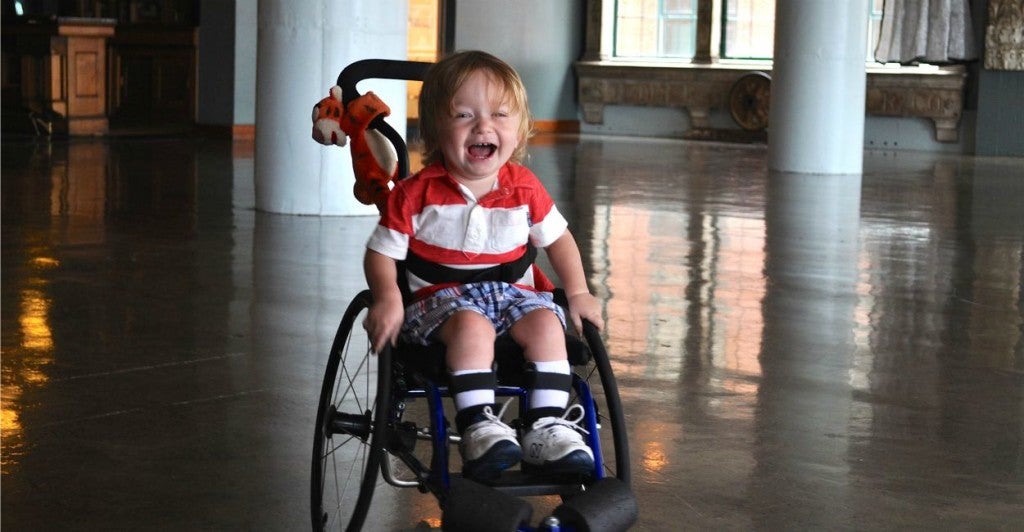Katie Myers and her 18-month-old son Kaden spend nearly every day at the South Florida Science Center and Aquarium in West Palm Beach.
Recently, on an otherwise ordinary trip to the Science Center, the duo met a young boy who showed them an unexpected amount of kindness.
Though it may not sound like much, the young boy helped Kaden play with an exhibit. Kaden, who suffers from spinal muscular atrophy (SMA), a motor neuron disorder that affects muscle control, was confined to a wheelchair when he was just seven months old.
“At home he doesn’t have much room to explore, so we’re there almost every day because, to Kaden, it’s like his playground,” Katie Myers told ABC News. “It’s big and has smooth, concrete floors. It’s his own accessible little paradise.”
On this occasion, the other boy started to play and interact with Kaden, treating him not at all differently from how he would treat any other kid. The boy helped Kaden pick up a ball off the floor and turn a lever on an interactive exhibit, never once questioning what might be wrong with the child.
“I’m not used to someone seeing Kaden just for who he is and not for his disability,” Myers told TODAY.com.
SMA, a genetic disorder and the number-one killer of children under 2, will cause Kaden’s muscles to progressively weaken. Capturing every moment she can with Kaden, Myers snapped a photo as her son put his hands above his head, something he normally cannot do.
Myers posted the photo to Facebook and thanked the mystery boy for playing with her son. The photo received 10 million views.
To the little boy at the science museum, I don’t know who you are, but thank you for being amazing. You let my son play…
Posted by Kaden’s Cure for Spinal Muscular Atrophy on Thursday, August 13, 2015
“To the little boy at the science museum, I don’t know who you are, but thank you for being amazing,” she captioned the photo. “You let my son play and engage with you. You helped him pick up balls from the floor when you saw that he could not. You didn’t ask what was wrong with him or why he couldn’t walk, you just saw him. Kaden is a lot like you, he is very curious and wildly smart. He wants to know how everything works. Thank you for helping him turn the lever when you noticed he was too weak to do it himself. You will probably never see this but just by being you, you make this world better.”
She woke up the next morning to see that her post had gone viral, with many likes, shares, and comments.
“When given the opportunity, kids see each other for kids,” Myers told the Huffington Post. “They don’t see any differences.”
Those with SMA have the disease in varying severity. Kaden has Type 2, which means that he is still able to sit up, but not walk or stand on his own.
Typically, as SMA progresses, the ability to walk, stand, eat, swallow, and breathe can be affected. More than half of the babies diagnosed do not live to see their second birthday. One in 40 people unknowingly are carriers of the disease.
“Every parent I have ever met has learned about SMA on the same day they were told their baby would die from the disease,” Myers wrote Wednesday on the Kaden’s Cure Facebook page. “That’s not okay and hopefully things are starting to change.”
In Kaden’s case, he was born healthy. After doctors brushed off little issues, Myers began to seek answers on her own.
“I had a feeling in the pit of my stomach that something was seriously wrong and couldn’t take ‘new mommy syndrome’ for an answer,” Myers wrote on the Kaden’s Cure website. She went online and read about SMA.
“I felt a part of myself die inside because every symptom and characteristic sounded exactly like our Kaden,” she wrote.
Today, Myers remains hopeful, working to raise awareness for the disease.
“Hopefully doctors will stop feeding parents false information about the need to terminate pregnancies affected with SMA when they can’t even predict its severity, or let nature take its course with the children that are here,” she wrote on Facebook. “They will tell you that life with SMA in its most severe form is not a life at all, but in every one of these remarkable children, we see life, not lack.”
She continued: “To the little boy who started all of this, I’m sure your parents have told you the impact you are making on this world. People are questioning the way that they view disability, and that is priceless.”
